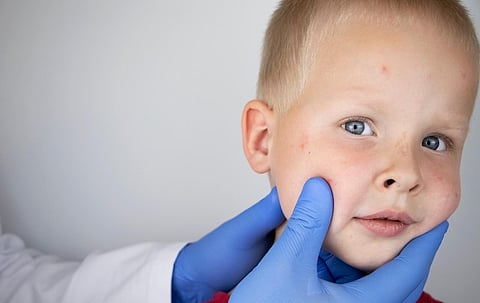FRIDAY, Feb. 23, 2024 (HealthDay News) -- Amid an outbreak of measles at a Florida elementary school, the state's surgeon general has defied federal health guidance and told parents it's up to them whether they want to keep their unvaccinated child home to avoid infection.
In a letter to parents of children attending Manatee Bay Elementary school in Weston, where six cases of measles have already been reported, Florida surgeon general Dr. Joseph Ladapo said the state health department “is deferring to parents or guardians to make decisions about school attendance.”
That advice runs counter to what Ladapo acknowledged in his letter was the “normal” recommendation that parents keep unvaccinated children home for up to 21 days -- the incubation period for measles.
This is not the first time that Ladapo has challenged health recommendations from the U.S. Centers for Disease Control and Prevention: Last month, he called for halting the use of COVID vaccines made by Pfizer and Moderna.
Ben Hoffman, president of the American Academy of Pediatrics, told the Washington Post that Florida’s new guidance flies in the face of standard public health guidance for measles, a disease that can result in severe complications and even death.
“It runs counter to everything I have ever heard and everything that I have read,” Hoffman said. “It runs counter to our policy. It runs counter to what the [CDC] would recommend.”
As more parents seek exemptions from childhood vaccinations, measles cases have climbed in this country.
In 2024 alone, at least 26 cases in at least 12 states have been reported to the CDC, roughly double the number at this point last year. Along with the six cases confirmed in the Florida school, cases have been reported in Arizona, California, Georgia, Maryland, Minnesota, Missouri, New Jersey, New York City, Ohio, Pennsylvania and Virginia.
In January, the CDC issued a warning to health providers to be on alert for more measles cases. Infected people are contagious starting four days before a rash develops and up to four days afterward.
Measles is highly contagious, particularly to unvaccinated people: Up to 90% of those without immunity will contract measles if exposed, the CDC says. Conversely, those who have been infected or received the full two doses of the MMR vaccine are 98% protected.
“The reason why there is a measles outbreak in Florida schools is because too many parents have not had their children protected by the safe and effective measles vaccine,” John Moore, a professor of microbiology and immunology at Weill Cornell Medical College in New York City, told the Post. “And why is that? It’s because anti-vaccine sentiment in Florida comes from the top of the public health food chain: Joseph Ladapo.”
When asked to comment, the Florida health department sent a link to Ladapo’s letter, the Post reported.
Paul Offit, a pediatric infectious diseases expert at Children’s Hospital of Philadelphia, told the Post that Ladapo’s failure to urge vaccination or quarantining endangers children.
“Is he trying to prove that measles isn’t a contagious disease when the data are clear that it is the most contagious vaccine-preventable disease, far more contagious than influenza or COVID?” Offit said.
A drop below 95 percent vaccination coverage for measles can jeopardize herd immunity. Florida’s state vaccination coverage is 90.6 percent, the Post reported.
About 1 in 5 unvaccinated Americans who catch the measles is hospitalized, according to the CDC. Up to 1 of 20 children develop pneumonia. Nearly 1 child out of every 1,000 with measles will develop swelling of the brain that can leave a child deaf or with an intellectual disability. For unvaccinated infants who get the measles, 1 in 600 can develop a fatal neurological complication that can lie dormant for years.
More information
The U.S. Centers for Disease Control and Prevention has more on the history of measles.
SOURCE: Florida Surgeon General, parent letter, Feb. 20, 2024; Washington Post


